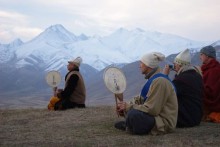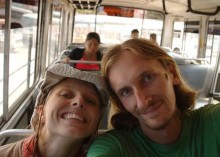Kolomyia-born Bohdan Matkovsky and Kyivite Zinaida Kryvosheieva married in October 2011 and went for a wedding trip, which lasted for 18 months. During this period the married couple visited Romania, Bulgaria, Macedonia, Turkey, Cyprus, Kurdistan, Georgia, Armenia, Nagorny Karabakh, Russia, Kazakhstan, Kyrgyzstan, China, Laos, Cambodia, Thailand, and Sri Lanka, and even lived for a while in some of these countries and regions. Of course, Bohdan and Zina say, they could have visited much more countries during 1.5 years, but they were pursuing a different purpose. If the couple liked the place, they stayed there for an infinite period – till they got bored. Since the very beginning Bohdan and Zina decided they were going to travel with an unknown date of return. They told their parents they would go no less than for half a year. “We planned to go to the East, towards Polynesia, depending on circumstances,” Bohdan said.
The couple had a limited budget, 5,000 dollars they managed to save for a lengthy travel. They decided to spend 10 dollars a day for two for everything – transport, food, and dwelling. “Most of the time we spent much less,” Bohdan smiles, “There were many days when we spent nothing. For example, we were staying as guests or had a company, or the driver fed us or invited us to stop overnight. On some days we spent more, but there were only a few of them. As a result, we saved 1,500 dollars out of 5,000 over a 1.5 year period. Flight tickets home ‘ate’ another thousand. We spent most of the money for food or visas. Plus, there were unexpected expenditures we could not escape: for example, when our PC data module broke down or sandals were torn. So, the journey turned out to be less costly than we had expected.”
We had minimum preparations for the travel: we renewed our tourist equipment, bought a new sleeping bag, camera, and a laptop. Zina says they had “known, read, or heard something about the countries they were going to, but had not had any special preparation.” “We could learn some basic words before crossing the border, but most often the drivers, who picked us up on the road, taught us their language,” the girl says.
NO FEAR
“We were most of all afraid that we would soon run out of money and would have to go back home on the second month. Roughly said, this problem is not worth a pin. For that matter, you can earn money during the journey,” Bohdan says.
The couple says they resigned from their jobs without any problem and set out for a journey. At first, Bohdan and Zina had some fears that some unpleasant situations would happen to them in the foreign countries, but soon their fears vanished.
“The probability that we will be robbed is not higher than other people’s. Basically, we were quite careful. For example, we chose the place for a tent very carefully, so that it was seen from the road. We trusted our experience and instincts. If they said that some bushes were good for a tent, we put it up there,” Bohdan says. He recalls that almost everywhere they felt completely safe: “In Armenia, In Karabakh, strange as it may seem.”
“Travelers should better avoid tourist attractions,” Zina shares her experience, “because there are much many thieves hunting for tourists than in an ordinary village. There you can at the worst come across a local drunkard, and at a tourist hub you will run across tourist hunters. We had been warned in Cambodia to be watchful in tourist sights. Tourists came up to us and said, ‘Please, don’t leave your things even a meter away from you. Your things must be on you – otherwise you will be robbed of all your possessions in the blink of an eye.’ In Cambodia we were warned not to wear gold jewelry. The favorite way of robbery in their capital is when a person on a scooter goes by, grasps the piece of jewelry on your neck or a bag and tears it off. ”
“But it only sounds fearful. In fact, everything is not so bad, and there are not so many places or people like this. You simply need to know how to behave: not to show you have money and where you keep it, not to carry expensive cell phones with you,” Bohdan says and changes the subject to a more positive one.
“The rest is all positive. It’s communication with new people, many new friends, unique and interesting people, who pick you up, drive you, tell you something. Dull and sad people never give a ride to hitchhikers – they don’t need it. Only joyful people pick you up, who are interesting interlocutors, who can tell you something, drive into some cool place, advise what to see in the country, and who may invite you to their place. In every country there are people to whom we can go back as to our family. Georgians write to us: when will you come home? Home is Georgia,” Bohdan and Zina chuckle.
THE LALIASHVILI FAMILY AND MISTER PAN
Bohdan and Zina’s longest stay was in Georgia. They lived in a village in the Laliashvili family house, where they helped about the house and with vineyards. There the couple learned to make wine and churchkhela. “A long-distance truck driver ‘picked us up’ in Georgia. He turned out to be a very interesting person, an architect with a command of five or six languages. He was fired because since Saakashvili came to power in Georgia, there has been a trend to hire only young people and he was about 50. That was the way he became a long-distance truck driver. After all, he does not complain, because he travels much about the world, too. We understood right away that he was our soul mate. In the end he brought us to his village where his father lives alone in a big house. His father has several hectares of vineyards, chicken, and a dog. So we lived there, cooked the food, and helped in the vineyards,” Bohdan says, and Zina adds:
“His father is professor of mathematics, he’s about 80. In the morning he goes to the vineyards and works there for half a day without a break. These people have good health.”
Another place, where the couple stayed for three months, was Mr. Pan’s house in Thailand. “He is an extraordinary person,” Bohdan and Zina chuckle. “We met him quite accidentally, as well. The first car we met near the Cambodia-Thai border stopped and picked us up. It was driven by a very talkative man. We stopped at the village that was nearest to the border. In the evening he invited us to a cafe for whisky and soda, and there we met Mr. Pan. Can you imagine? A man with stubble, wearing very dirty clothes and a knit warm hat, having a bag in his hands enters the cafe. When I saw him for the first time, I thought he would start asking money to help a hangover. But everyone greeted him cheerfully: ‘Mr. Pan!’ It turned out he worked at a construction site, so he did not wear any new clothes. He also wore eyeglasses with light-green rim,” Zina recalled. Mr. Pan invited them to his place to stay overnight and the couple agreed.
“We spent a night there, and Mr. Pan said we could stay as long as we wanted. We said: OK, we’ll stay for a few days, it is so cool here! As a result, we have lived there for three months. We started teaching English to local children, helped about the house, planted pineapples and fruit trees, and went fishing. Mr. Pan is a very interesting personality: in his youth he has worked as a migrant worker all over South-Eastern Asia – from Malaysia and Singapore to Bangladesh and Sri Lanka. Having earned some money, he built a land plot. He built on his own a water-supply from the nearest lake. He is a much respected man,” Zina says.
On the whole, the couple was left with the best memories about the people they met during the travel. “Thailand, Turkey, Bulgaria, Georgia, Armenia, and Karabakh were the most comfortable. China is a very interesting country and quite comfortable as well, but we did not understand there a thing. The Chinese are always ready to help. If they see you looking at the map, unable to understand something, they arrange a kind of meeting around you, so sincerely they want to help. But they don’t speak English.”
QUESTION OF CHOICE
“During the travel our worldview outlook changed a lot. We saw that there are versions other from office, alternative realities where one can live,” Bohdan shares the experience he obtained. The couple assures: the office routine is no longer for them, because they have learnt to appreciate their time and spend it qualitatively.
“When your budget is limited, you understand that in Ukraine you can live cheaper then you were living when had a job. In fact, you need less money, and the thing is only about your choice: either to buy a new iPhone or not to buy it and live with the old one. This is a question of priorities. After the journey the priority of freedom and time we can use as we like has only grown,” Zina shares.
The girl also says that traveling has changed her attitude to Ukraine. “I did not expect that after traveling via Asia my attitude to Ukraine would improve. We were very much helped by Ukrainians in Kazakhstan, Ukrainian girls in China and Kirghizia helped us a lot. After this I started to respect Ukrainians more than before. If only Ukrainians helped each other as much in Ukraine, everything would have been very well,” she recalls.
Besides, the traveler says, there are a lot of things in traveling “which you don’t notice at first, but when you pay attention, you feel strange.” “For example, in Eastern countries, especially in Laos and China, during the month-long journey I saw only one child cry. And it felt really unusual. All children are calm there, nobody shouts at them, they are curious and communicative, and nobody yells, ‘Don’t come to strangers!’” Zina explains. According to the couple, they have started to treat people differently. “In our country, a person who sleeps outside is immediately considered homeless. In Thailand, Laos, or Cambodia, a person wearing a costume and a tie can sleep in the street. You can very frequently be witness to a scene when hammock is hung up between two columns, and someone is sleeping there. Why not?” Bohdan gives an example of a simpler attitude to life.
During their journey the couple was running a blog on the Internet, where they described their adventures and posted photos. In particular, in such a way they were getting in touch with their friends and family. Bohdan and Zina finished their journey when they found out that they would become parents. They say they will continue to travel, but in a new, family, format.








